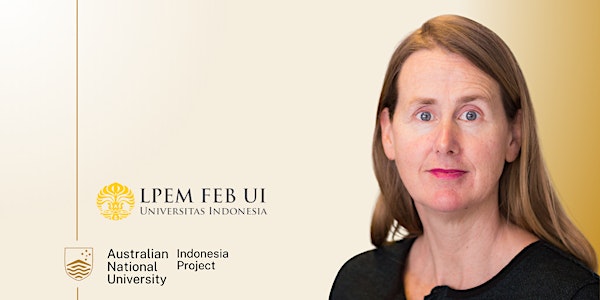This registration is for in person attendance. If you would like to attend online, please register on Zoom (click here).
The annual Sadli Lecture is a collaboration between the Institute for Economic and Social Research (LPEM FEB UI) and the Indonesia Project (The Australian National University) since 2007. Named in honour of the late Professor Mohammad Sadli, a leading Indonesian policy-maker and economist, the series aims to broaden understanding of, and stimulate debate on, key economic policy challenges faced by Indonesia.
Beginning in 2023, the annual Sadli Lecture will also include topics in gender equality and social inclusion in honour of Professor (Emeritus) Saparinah Sadli, a distinguished scholar, leader and advocate for human rights, social justice and gender equality in Indonesia.
The 2023 Sadli Lecture will be delivered by Professor Lisa Cameron (James Riady Chair in Asian Economics and Business, The University of Melbourne) entitled Gender equity and development: Indonesia in a global context.
Abstract. Gender equality in Indonesia is about where you’d expect given the country’s level of development. Indonesia has more gender inequality than some neighbouring countries and less than others; and less than in the vast majority of Muslim-majority nations worldwide, regardless of level of income. Women’s economic participation is however low relative to Indonesia’s level of development. Female labour force participation is low as many women leave the work force when they get married and have children, particularly in the formal sector as formal sector employers do not generally offer flexible workplace conditions that would increase their ability to retain female employees. Social norms that position mothers as the main caregiver play an additional important role in women’s low economic participation. Public information campaigns that challenge people’s perceptions of gender norms are likely to be an important component of efforts to increase women’s economic participation. Greater female economic participation has pay-offs in terms of increased national economic growth. By contributing to household income and reducing economic stress within the household, greater female labour force participation is also likely to reduce family violence and so lead to happier home and family lives. A focus on increasing women’s economic empowerment would be far-sighted as the country looks to recover from the pandemic and lay the groundwork for a dynamic future.
Program
09:00 – 09:30 Registration
09:30 Opening
09:35 Welcoming remarks by Dr Teguh Dartanto (Dean, FEB UI)
09:45 Keynote remarks by Professor (Emeritus) Mayling Oey-Gardiner (FEB UI)
10:00 Lecture: Gender equality and development: Indonesia in a global context by Professor Lisa Cameron (The University of Melbourne)
10:40 Discussion by Dr Putu Geniki Lavinia Natih (FEB UI) and Dr Asep Suryahadi (The SMERU Research Institute)
11:00 Question & answer session
11:55 Closing remarks by Dr Firman Witoelar (ANU Indonesia Project)
The event will be held in English. E-certificate available for in-person attendance (worth 1 KUM for S1 students).
Tersedia penerjemah ke Bahasa Indonesia dan Bahasa Isyarat Indonesia secara daring.
